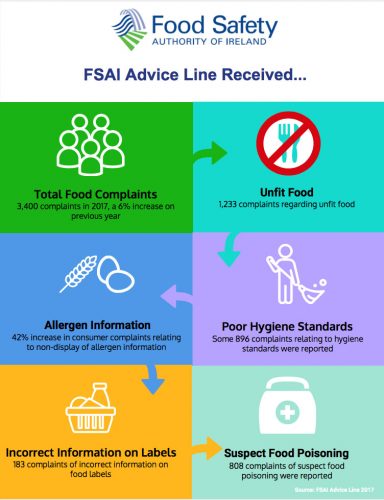Irish food safety received three complaints every day over unfit food
Posted: 14 February 2018 | George Smith (New Food) | No comments yet
The Food Safety Authority of Ireland (FSAI) has revealed its 2017 figures, showing a 42 per cent increase in complaints relating to non-display of allergen information.


SAFETY: Complaints rose by 6 per cent on 2016
The Food Safety Authority of Ireland (FSAI) received more than 3,400 complaints last year, with over a third related to unfit food.
Overall, the 2017 complaints saw an increase of 6 per cent on the 3,200 reported in 2016, with the number of complaints relating to non-display of allergen information up significantly at 42 per cent. A considerable increase was also noted among complaints relating to incorrect information on food labels at 17 per cent.
The FSAI said that the majority of consumer concerns relating to allergen information included a variety of non-compliance issues such as a lack of allergen information available in restaurants; confused messages regarding the presence of particular allergens in food; lack of awareness by food businesses of the legal requirement to display allergen information; allergens not highlighted on a food label; and allergens present in a food, but not indicated or displayed.
The categories of complaints were:
- 1,233 complaints on unfit food
- 896 complaints on hygiene standards
- 808 complaints on suspect food poisoning
- 183 complaints on incorrect information on food labelling
- 103 complaints on non-display of allergen information
- 102 other
Contamination of food with foreign objects was frequently reported by consumers, which included reports of food contaminated with insects and glass, as well as other foreign objects.


Of those complaints regarding poor hygiene standards in food premises, the presence of rats, mice and flies were cited. Others included poor personal hygiene habits of staff working in the food sector. Reports in this area cited staff wiping noses when preparing sandwiches; staff members picking up dropped food from the floor and then including the food to make a sandwich; and the smell of sewerage in food premises. All complaints received by the FSAI in 2017 were followed up and investigated by food inspectors throughout the country.
The FSAI’s Advice Line also offers advice and information and during 2017, there were 9,576 queries from people working in the food service sector – manufacturers, retailers, researchers, and consultants. The most popular queries were regarding legislation on food labelling requirements; requests for FSAI publications, as well as information for new food businesses setting up operations.
Dr Pamela Byrne, Chief Executive, FSAI sadi: “We welcome consumers and food businesses contacting us via our Advice Line. Having people spotting and reporting inappropriate and unsafe food and practices greatly aids our work and provides us with information that we can act upon.
“The year on year increase in our Advice Line statistics reflect a continued trend where consumers are showing they have zero-tolerance when it comes to poor food safety and hygiene standards in food products and in food premises.
“In 2017, we undertook a nationwide campaign to raise awareness of the importance and legal requirement for allergen information to be displayed and communicated accurately to consumers in food service establishments. We are seeing consumers becoming more aware and having a greater understanding of what they should expect from food establishments in Ireland.”
Related topics
Allergens, Contaminants, Food Safety, Free From, Outbreaks & product recalls, Packaging & Labelling, The consumer









